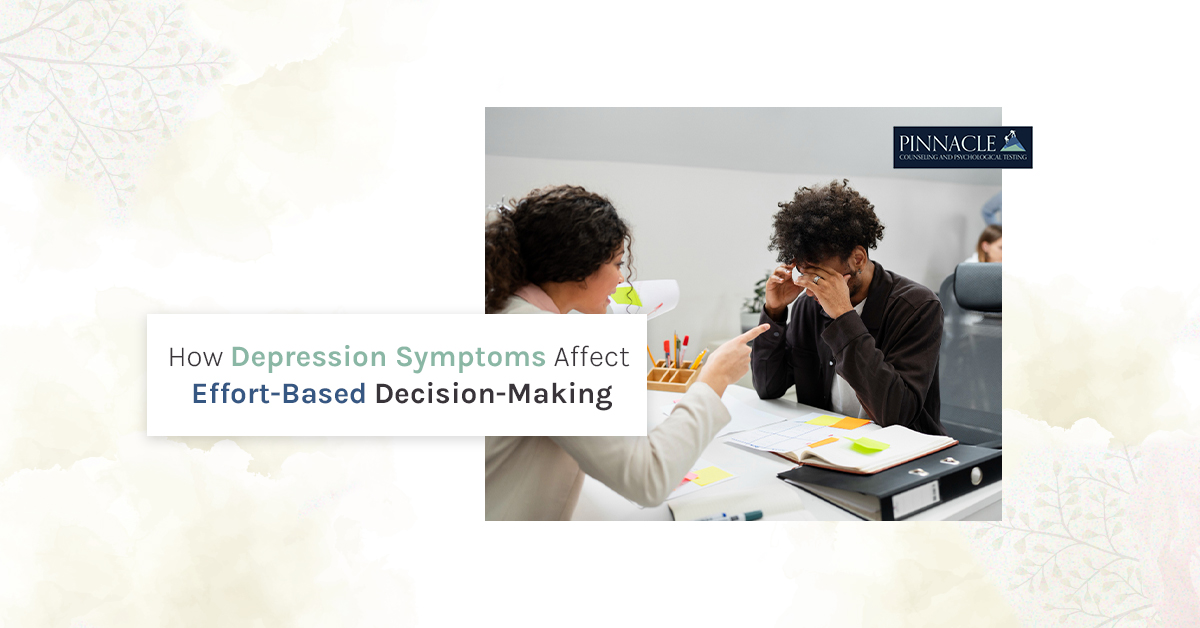Depression is a complex mental health condition that influences various aspects of cognition and behavior. A recent study published in Psychological Medicine examines how different symptoms of depression impact effort-based decision-making, particularly in tasks requiring physical and cognitive effort (Hiser et al., 2024). The findings suggest that individuals with higher anxiety levels are more willing to exert cognitive effort, while those experiencing anhedonia and apathy tend to avoid physical effort. Additionally, more severe depression symptoms are linked to a lower likelihood of abandoning tasks in search of better opportunities, indicating a shift in the perceived value of time (Hiser et al., 2024).
Understanding Effort-Based Decision-Making
Effort-based decision-making refers to the process of weighing the costs and benefits of engaging in tasks that require effort. The study involved 97 participants, including 67 individuals diagnosed with major depressive disorder. Participants completed the Effort Foraging Task, which measured their willingness to exert effort in exchange for rewards. They had to decide whether to “harvest” rewards from a task that became progressively more difficult or move on to a new task, a process requiring either cognitive or physical effort (Hiser et al., 2024).
In the cognitive effort condition, participants completed working memory tasks of varying difficulty. In the physical effort condition, they performed repetitive key-pressing tasks. Researchers used computational models to analyze decision-making patterns, focusing on how long participants persisted before switching tasks. The study found that individuals with greater anxiety were more willing to engage in cognitive challenges, while those with high levels of apathy and anhedonia showed less motivation to perform physically demanding tasks (Hiser et al., 2024).
Implications for Mental Health Treatment
The results highlight the importance of examining specific symptoms of depression rather than viewing the disorder as a single entity. Understanding how distinct symptoms like anxiety, anhedonia, and apathy affect decision-making can help tailor treatment strategies. For instance, individuals with anhedonia, who struggle with motivation and reward processing, may benefit from behavioral activation therapy, which encourages participation in rewarding activities (Treadway et al., 2012). Similarly, those with anxiety-driven cognitive effort engagement might respond well to cognitive-behavioral strategies aimed at managing excessive mental workload.
Conclusion
This study provides valuable insights into how different symptoms of depression influence motivation and decision-making. Recognizing these distinctions allows for more precise and effective therapeutic approaches tailored to individual needs. As research continues, a deeper understanding of effort-based decision-making in depression could lead to improved interventions that enhance motivation and quality of life for those affected by the disorder.
References
Hiser, J., Smith, R., Balderston, N. L., & Pizzagalli, D. A. (2024). Depression symptoms and effort-based decision-making: A computational perspective. Psychological Medicine. https://doi.org/10.xxxx/xxxx
Treadway, M. T., Bossaller, N. A., Shelton, R. C., & Zald, D. H. (2012). Effort-based decision-making in major depressive disorder: A translational model of motivational anhedonia. Journal of Abnormal Psychology, 121(3), 553–558. https://doi.org/10.1037/a0028813


